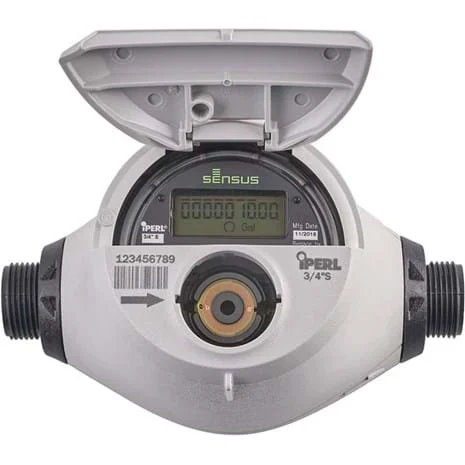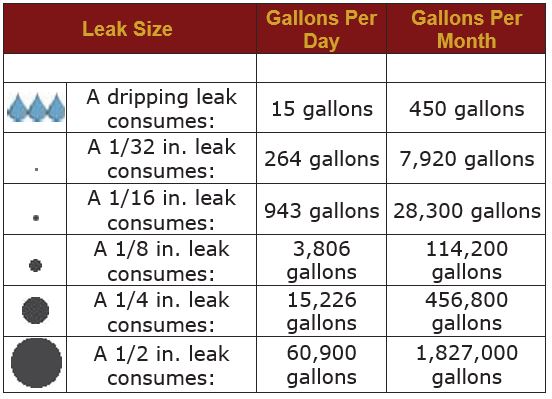An unusually high water bill is most often caused by a leak, irrigation, change in water use or a true-up bill from previously estimated bills. For more information on true-up bills: Estimated Meter Readings
Some common causes of high-water bills include:
- A leaking toilet, or a toilet that continues to run after being flushed (see additional information below)
- A dripping faucet; a faucet drip can waste 20 gallons of water a day or more
- Filling or topping off a swimming pool
- Watering the lawn, new grass, or trees; also check for an open hose bib
- Kids home for summer vacations or school holidays; guests
- Water-cooled air conditioners
- A broken water pipe or obvious leak; check the pipes in the basement or crawlspace; the water heater could also be leaking
- Running the water to avoid freezing water pipes during cold weather
Generally, water consumption is higher during the summer due to watering of lawns, pools, and gardening. Typically, an average family of four uses 4000-5000 gallons of water a month. Here are a few things to check if you get a bill that’s higher than usual.
Track your water usage
Water customers with meters inside of their home can flip open the cover to monitor water usage and check for a leak.
- Turn Off All Water: Start by making sure there isn’t any water being used inside or outside your home including lawn or garden irrigation, toilets, clothes washers, dishwashers, faucets, icemakers, and automatic backflow cleaning in whole house water filters.
- Check for changing digits: Open the cover on the water meter in your home. If all water is off and the number is increasing, then piping should be further investigated. Water meter image is below.
- Note: Not all customers have meters inside their home. Some customers have meters in crawl spaces and inside meter pits.

Changes in your water use
Did you have house guests, water your lawn more than usual, or do anything else out of the ordinary in the last month that uses a lot of water? If so, this may account for an increase in your water bill.
Check for leaks
Leaks, whether unseen or unfixed, can waste hundreds and even thousands of gallons of water. It is important to routinely check your plumbing and home for leaky faucets, toilets, and outside taps and irrigation lines.
Toilet and faucet leaks
The most common cause for a high water bill is running water from your toilet. A continuously running toilet can waste up to 200 gallons a day. That can double a family’s typical water use, so fix toilet leaks as soon as possible. Some leaks are easy to find, such as a dripping faucet or running toilet. You can usually hear a running toilet, but not always.
See the toilet assessment below for help in determining if this is the cause of your high water bill.
Outdoor and underground leaks
Leaks can also occur in harder to find places, such as under your house or if you have a meter pit in the service line between your water meter and your home. Check outdoor spigots and crawl spaces, and look for wet spots in your yard, which may indicate a leak
Do-It-Yourself Toilet Assessment
First check for the most common leak: a deteriorated or defected flush valve (flapper) ball at the bottom of the toilet tank. If it does not make a tight seal water will leak into the toilet bowl. To check for this:
- Take the lid off of the tank behind the bowl, flush the toilet, then wait for it to fully fill after the flush
- Put a few drops of dye or a colored dye tablet in the tank
- Wait at least 20 minutes; longer if you suspect it is a small leak
- If there is any color in the toilet bow, there is a leak.
The second most common type of leak has to do with an improperly adjusted or broken fill (ballcock) valve. To check for this take the lid off of the toilet tank, flush, and see if water is draining into the overflow tubes when the tank is full.
The following table shows the amount of water that can be lost (and billed to your account) for various size leaks.

Irrigation Systems
During the summer irrigation systems are a common source of high water use. Watering times generally double during the summer months compared to the winter. Automated irrigation systems should be checked regularly to be sure they are functioning properly and have no leaks or broken sprinkler heads. If a sprinkler valve sticks on, it could waste an extremely large quantity of water. The irrigation timer may not be programmed properly; i.e., sprinklers are watering too often and/or for too long. Reprogramming may be necessary if the power has been off.

